Lecture 3 11.02.ppt
- Количество слайдов: 14
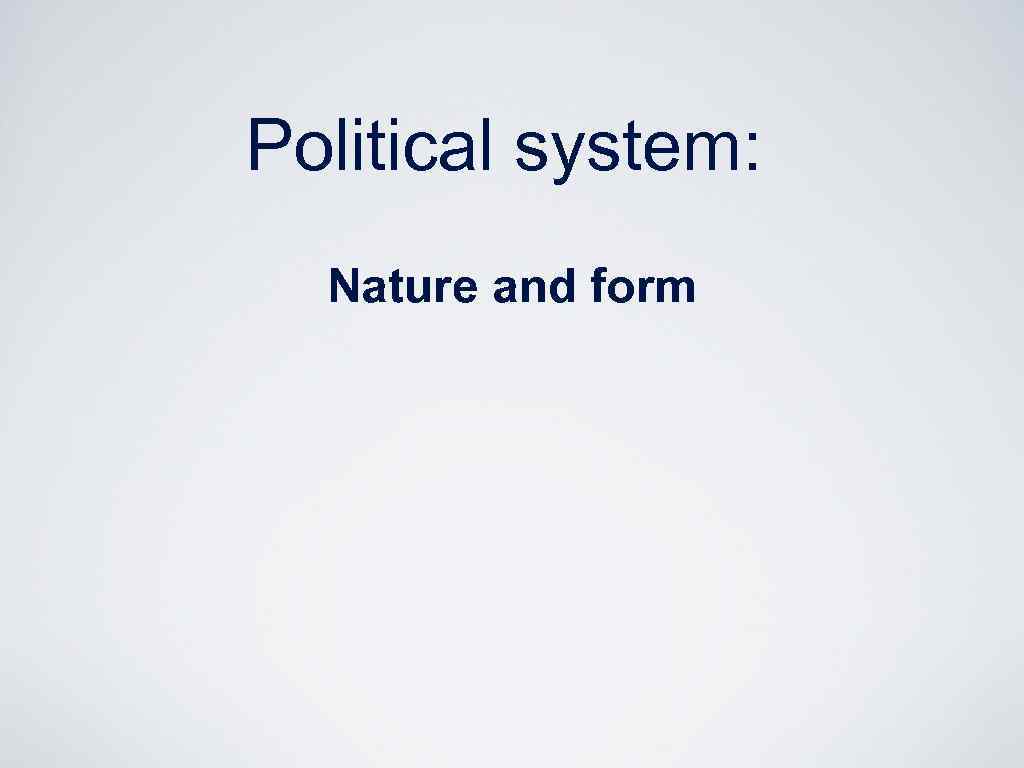 Political system: Nature and form
Political system: Nature and form
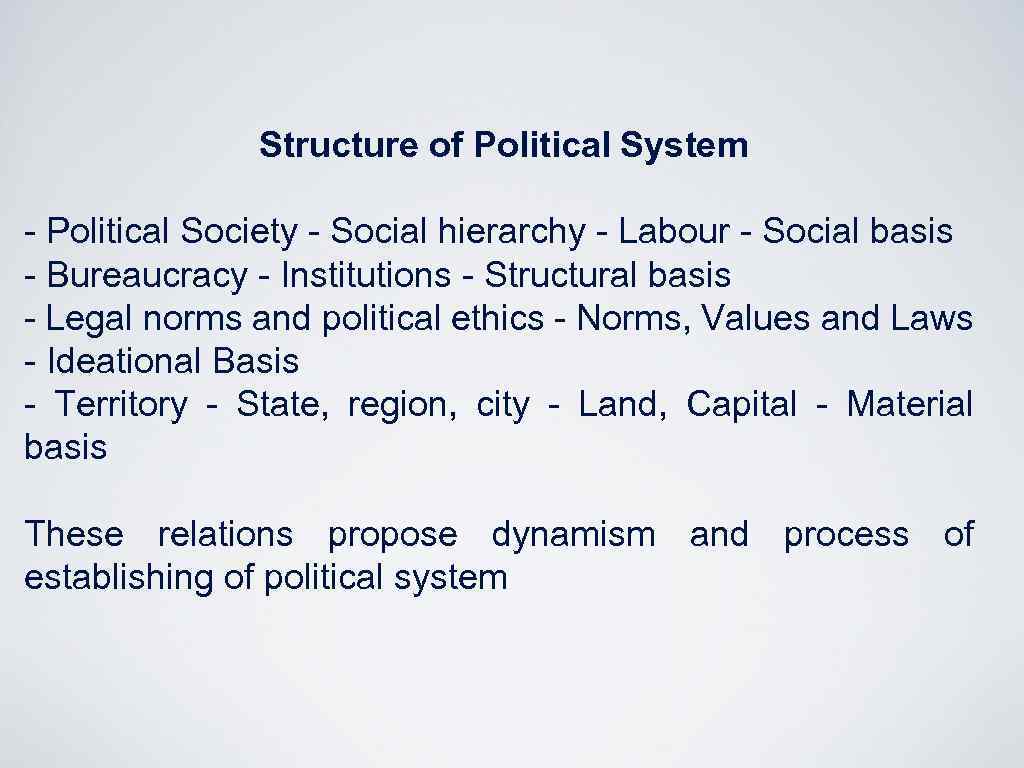 Structure of Political System - Political Society - Social hierarchy - Labour - Social basis - Bureaucracy - Institutions - Structural basis - Legal norms and political ethics - Norms, Values and Laws - Ideational Basis - Territory - State, region, city - Land, Capital - Material basis These relations propose dynamism and process of establishing of political system
Structure of Political System - Political Society - Social hierarchy - Labour - Social basis - Bureaucracy - Institutions - Structural basis - Legal norms and political ethics - Norms, Values and Laws - Ideational Basis - Territory - State, region, city - Land, Capital - Material basis These relations propose dynamism and process of establishing of political system
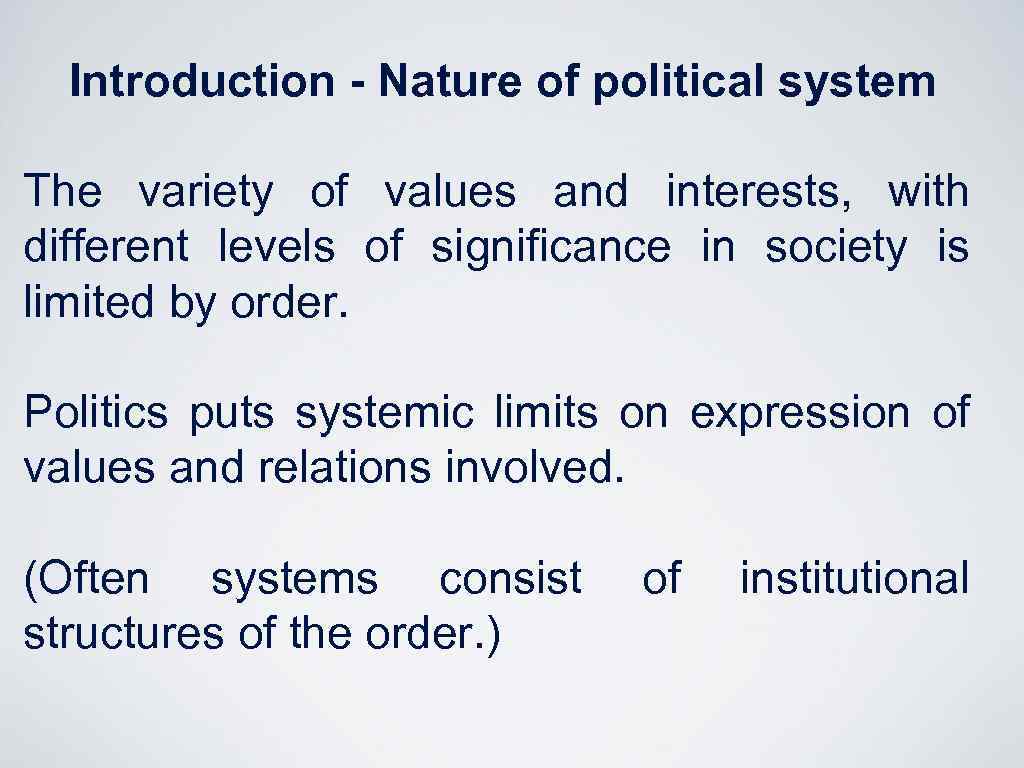 Introduction - Nature of political system The variety of values and interests, with different levels of significance in society is limited by order. Politics puts systemic limits on expression of values and relations involved. (Often systems consist structures of the order. ) of institutional
Introduction - Nature of political system The variety of values and interests, with different levels of significance in society is limited by order. Politics puts systemic limits on expression of values and relations involved. (Often systems consist structures of the order. ) of institutional
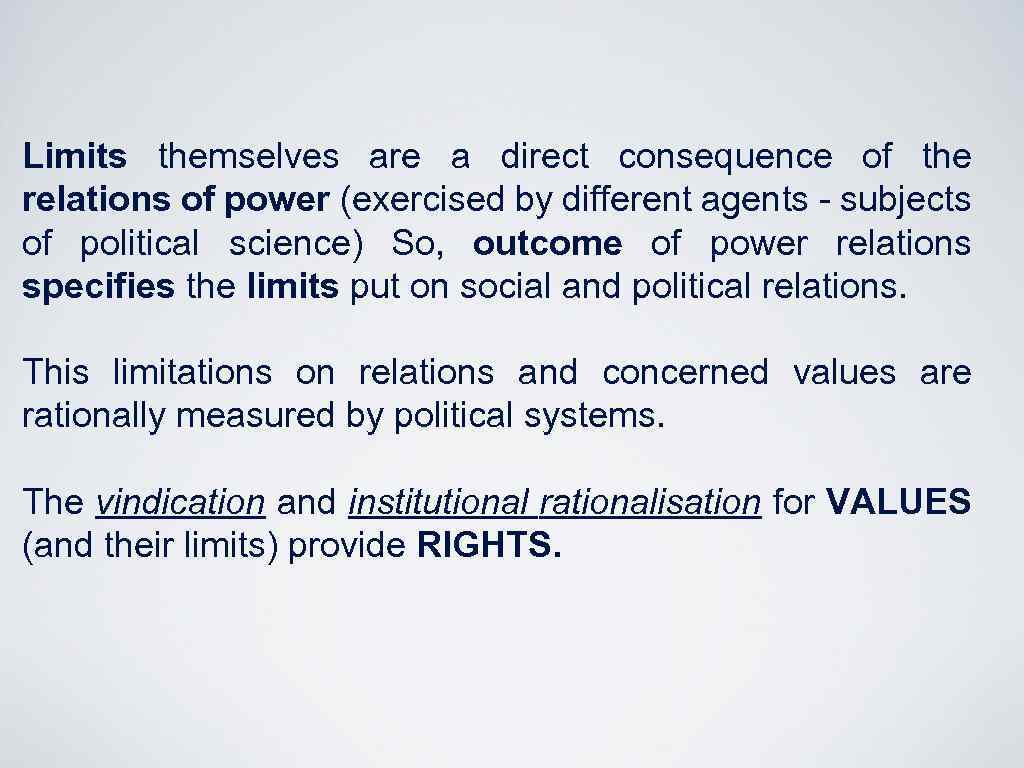 Limits themselves are a direct consequence of the relations of power (exercised by different agents - subjects of political science) So, outcome of power relations specifies the limits put on social and political relations. This limitations on relations and concerned values are rationally measured by political systems. The vindication and institutional rationalisation for VALUES (and their limits) provide RIGHTS.
Limits themselves are a direct consequence of the relations of power (exercised by different agents - subjects of political science) So, outcome of power relations specifies the limits put on social and political relations. This limitations on relations and concerned values are rationally measured by political systems. The vindication and institutional rationalisation for VALUES (and their limits) provide RIGHTS.
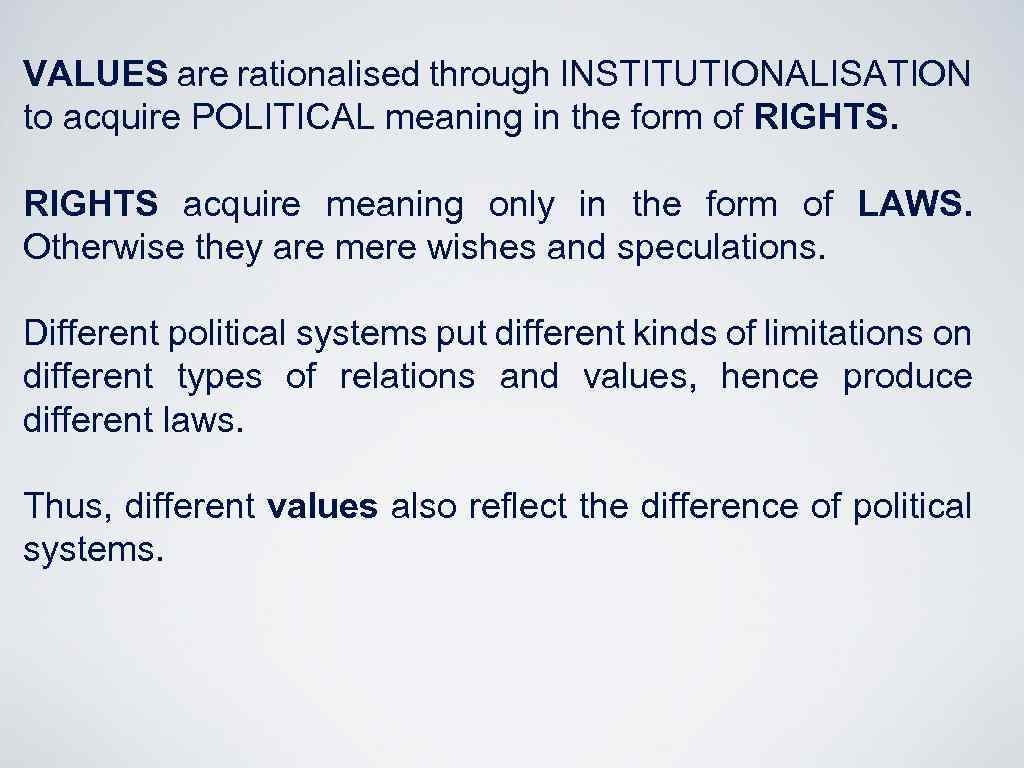 VALUES are rationalised through INSTITUTIONALISATION to acquire POLITICAL meaning in the form of RIGHTS acquire meaning only in the form of LAWS. Otherwise they are mere wishes and speculations. Different political systems put different kinds of limitations on different types of relations and values, hence produce different laws. Thus, different values also reflect the difference of political systems.
VALUES are rationalised through INSTITUTIONALISATION to acquire POLITICAL meaning in the form of RIGHTS acquire meaning only in the form of LAWS. Otherwise they are mere wishes and speculations. Different political systems put different kinds of limitations on different types of relations and values, hence produce different laws. Thus, different values also reflect the difference of political systems.
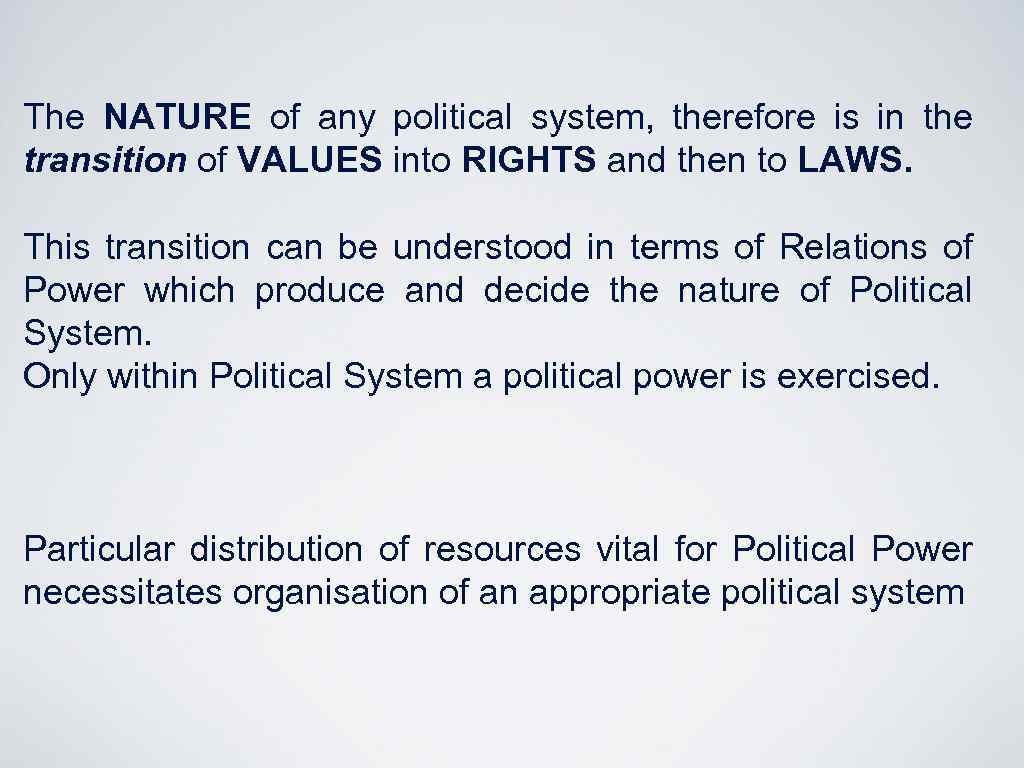 The NATURE of any political system, therefore is in the transition of VALUES into RIGHTS and then to LAWS. This transition can be understood in terms of Relations of Power which produce and decide the nature of Political System. Only within Political System a political power is exercised. Particular distribution of resources vital for Political Power necessitates organisation of an appropriate political system
The NATURE of any political system, therefore is in the transition of VALUES into RIGHTS and then to LAWS. This transition can be understood in terms of Relations of Power which produce and decide the nature of Political System. Only within Political System a political power is exercised. Particular distribution of resources vital for Political Power necessitates organisation of an appropriate political system
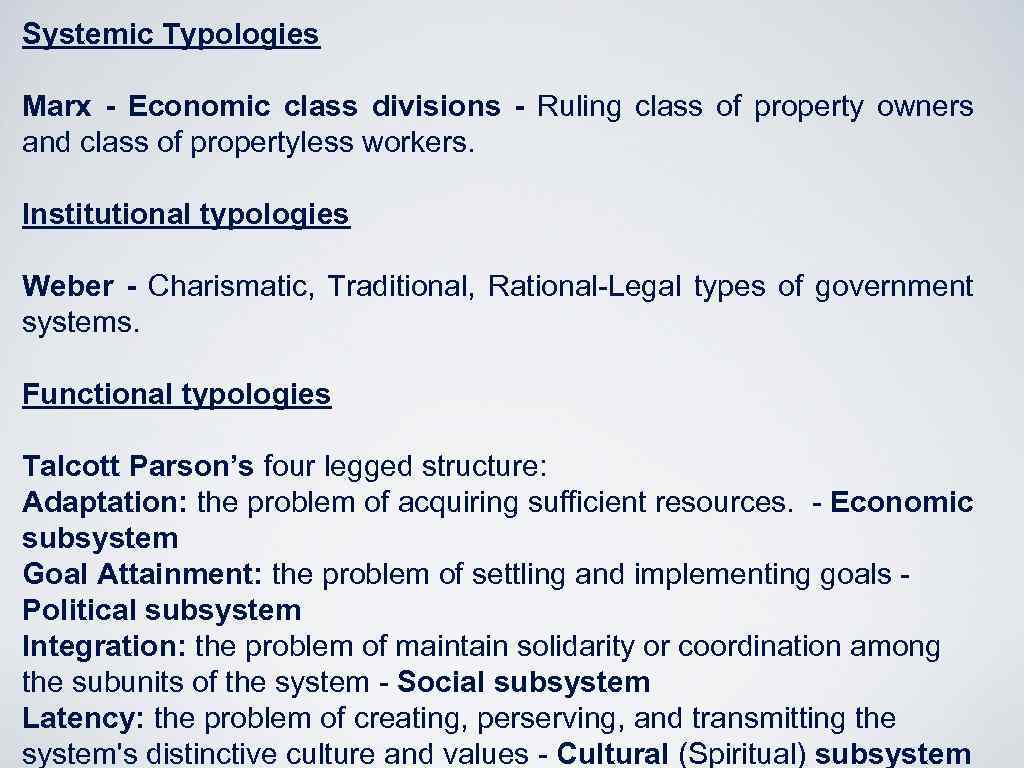 Systemic Typologies Marx - Economic class divisions - Ruling class of property owners and class of propertyless workers. Institutional typologies Weber - Charismatic, Traditional, Rational-Legal types of government systems. Functional typologies Talcott Parson’s four legged structure: Adaptation: the problem of acquiring sufficient resources. - Economic subsystem Goal Attainment: the problem of settling and implementing goals - Political subsystem Integration: the problem of maintain solidarity or coordination among the subunits of the system - Social subsystem Latency: the problem of creating, perserving, and transmitting the system's distinctive culture and values - Cultural (Spiritual) subsystem
Systemic Typologies Marx - Economic class divisions - Ruling class of property owners and class of propertyless workers. Institutional typologies Weber - Charismatic, Traditional, Rational-Legal types of government systems. Functional typologies Talcott Parson’s four legged structure: Adaptation: the problem of acquiring sufficient resources. - Economic subsystem Goal Attainment: the problem of settling and implementing goals - Political subsystem Integration: the problem of maintain solidarity or coordination among the subunits of the system - Social subsystem Latency: the problem of creating, perserving, and transmitting the system's distinctive culture and values - Cultural (Spiritual) subsystem
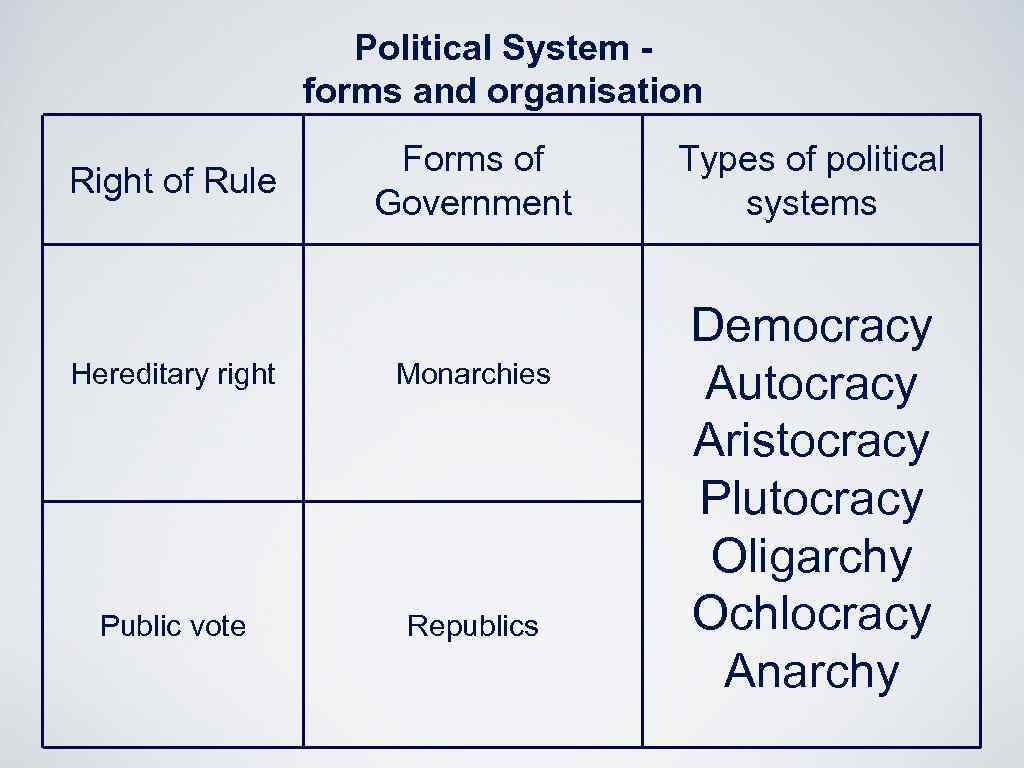 Political System forms and organisation Right of Rule Forms of Government Hereditary right Monarchies Public vote Republics Types of political systems Democracy Autocracy Aristocracy Plutocracy Oligarchy Ochlocracy Anarchy
Political System forms and organisation Right of Rule Forms of Government Hereditary right Monarchies Public vote Republics Types of political systems Democracy Autocracy Aristocracy Plutocracy Oligarchy Ochlocracy Anarchy
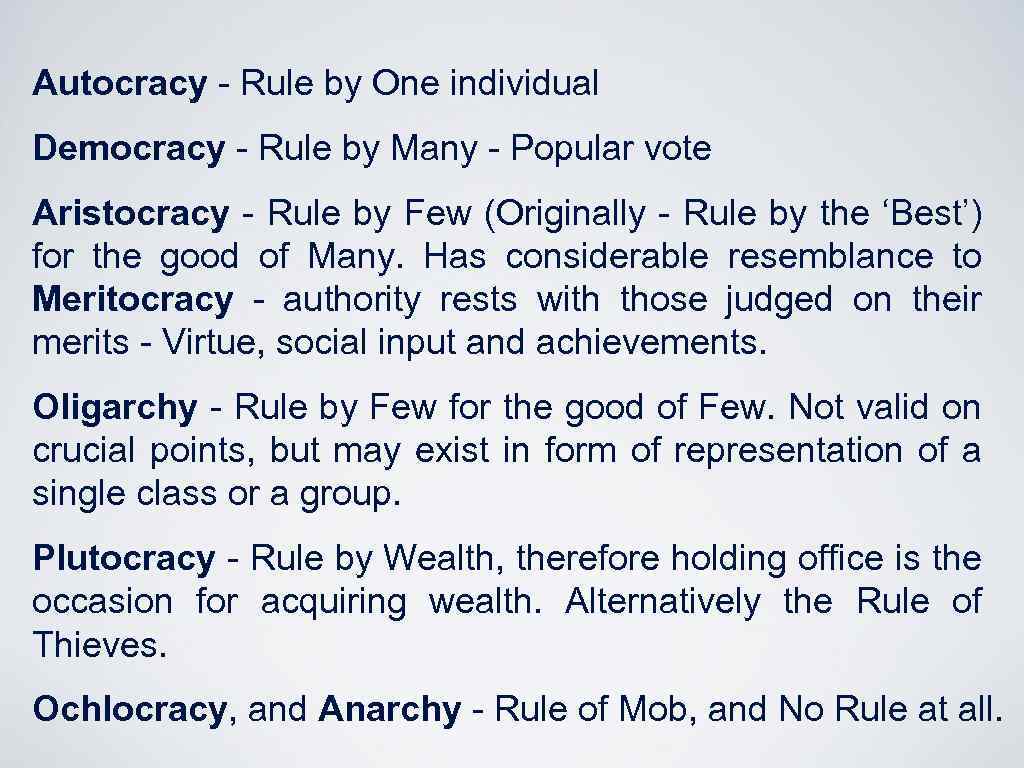 Autocracy - Rule by One individual Democracy - Rule by Many - Popular vote Aristocracy - Rule by Few (Originally - Rule by the ‘Best’) for the good of Many. Has considerable resemblance to Meritocracy - authority rests with those judged on their merits - Virtue, social input and achievements. Oligarchy - Rule by Few for the good of Few. Not valid on crucial points, but may exist in form of representation of a single class or a group. Plutocracy - Rule by Wealth, therefore holding office is the occasion for acquiring wealth. Alternatively the Rule of Thieves. Ochlocracy, and Anarchy - Rule of Mob, and No Rule at all.
Autocracy - Rule by One individual Democracy - Rule by Many - Popular vote Aristocracy - Rule by Few (Originally - Rule by the ‘Best’) for the good of Many. Has considerable resemblance to Meritocracy - authority rests with those judged on their merits - Virtue, social input and achievements. Oligarchy - Rule by Few for the good of Few. Not valid on crucial points, but may exist in form of representation of a single class or a group. Plutocracy - Rule by Wealth, therefore holding office is the occasion for acquiring wealth. Alternatively the Rule of Thieves. Ochlocracy, and Anarchy - Rule of Mob, and No Rule at all.
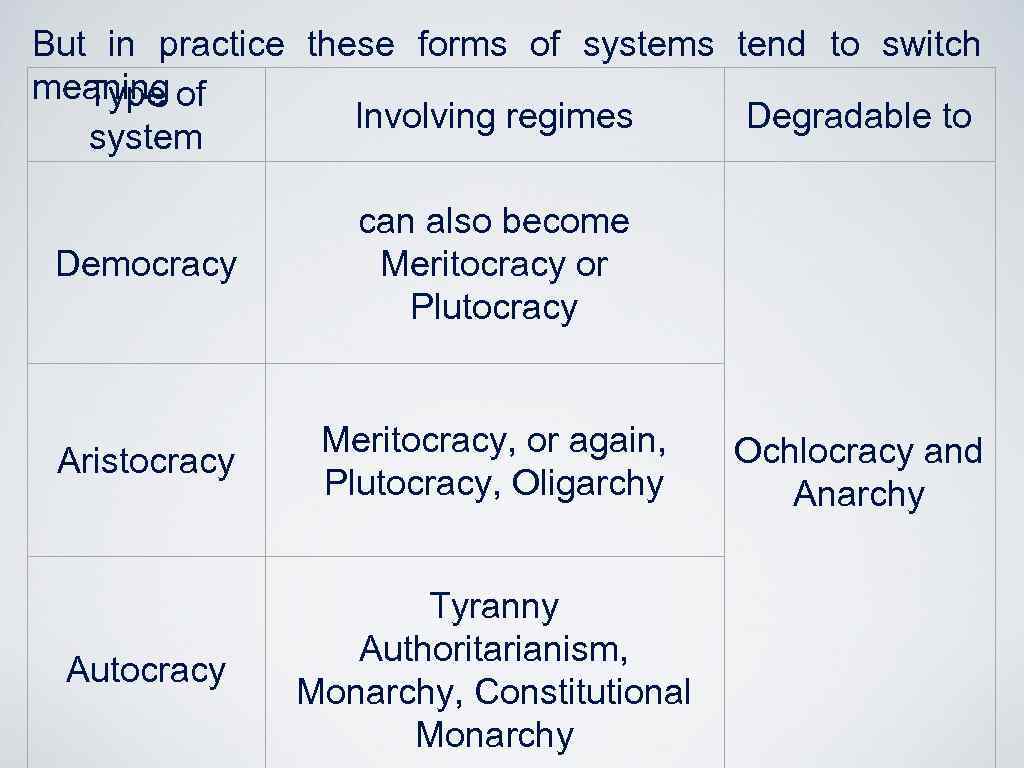 But in practice these forms of systems tend to switch meaning Type of Involving regimes Degradable to system Democracy can also become Meritocracy or Plutocracy Aristocracy Meritocracy, or again, Plutocracy, Oligarchy Autocracy Tyranny Authoritarianism, Monarchy, Constitutional Monarchy Ochlocracy and Anarchy
But in practice these forms of systems tend to switch meaning Type of Involving regimes Degradable to system Democracy can also become Meritocracy or Plutocracy Aristocracy Meritocracy, or again, Plutocracy, Oligarchy Autocracy Tyranny Authoritarianism, Monarchy, Constitutional Monarchy Ochlocracy and Anarchy
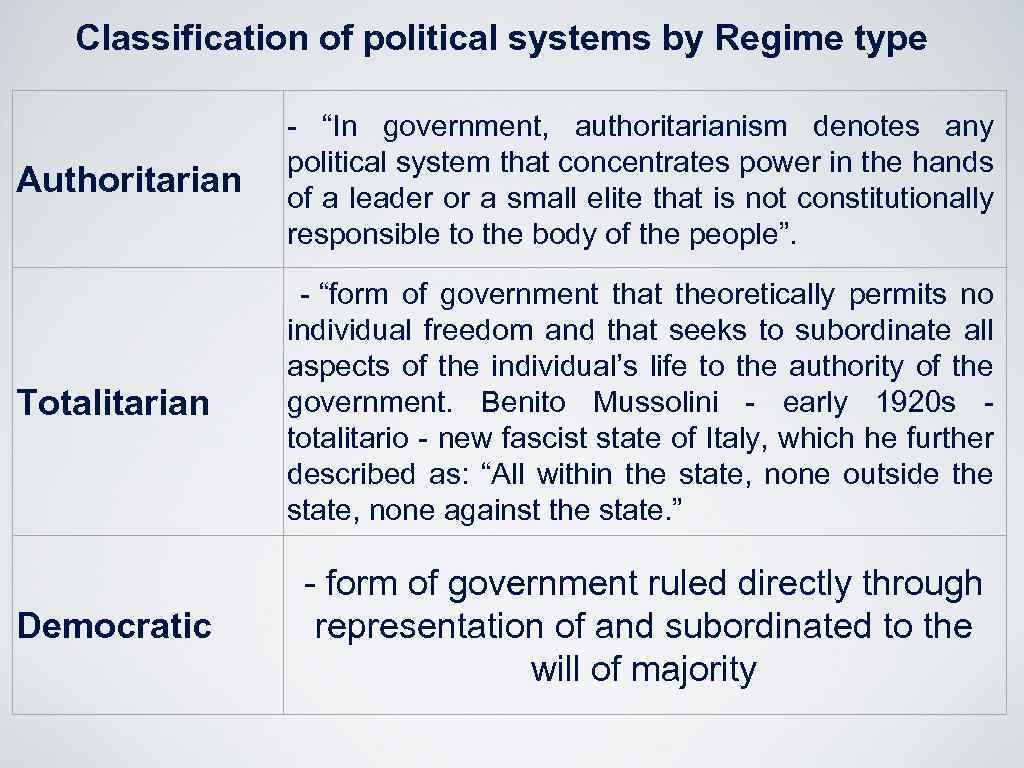 Classification of political systems by Regime type Authoritarian - “In government, authoritarianism denotes any political system that concentrates power in the hands of a leader or a small elite that is not constitutionally responsible to the body of the people”. Totalitarian - “form of government that theoretically permits no individual freedom and that seeks to subordinate all aspects of the individual’s life to the authority of the government. Benito Mussolini - early 1920 s - totalitario - new fascist state of Italy, which he further described as: “All within the state, none outside the state, none against the state. ” Democratic - form of government ruled directly through representation of and subordinated to the will of majority
Classification of political systems by Regime type Authoritarian - “In government, authoritarianism denotes any political system that concentrates power in the hands of a leader or a small elite that is not constitutionally responsible to the body of the people”. Totalitarian - “form of government that theoretically permits no individual freedom and that seeks to subordinate all aspects of the individual’s life to the authority of the government. Benito Mussolini - early 1920 s - totalitario - new fascist state of Italy, which he further described as: “All within the state, none outside the state, none against the state. ” Democratic - form of government ruled directly through representation of and subordinated to the will of majority
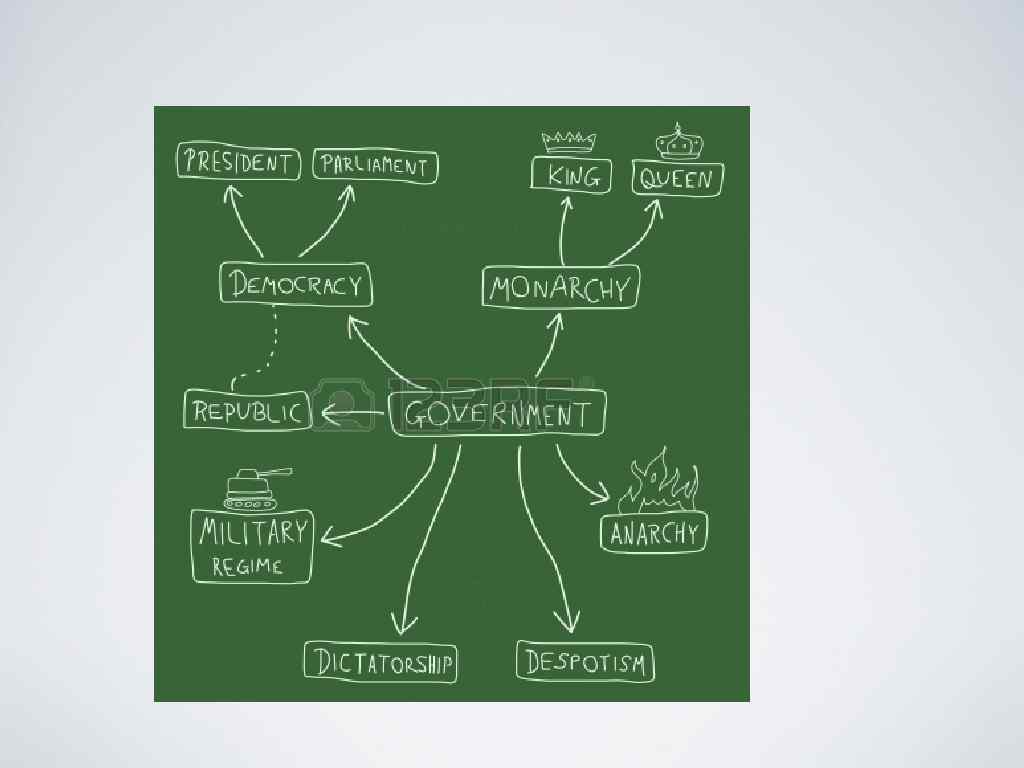
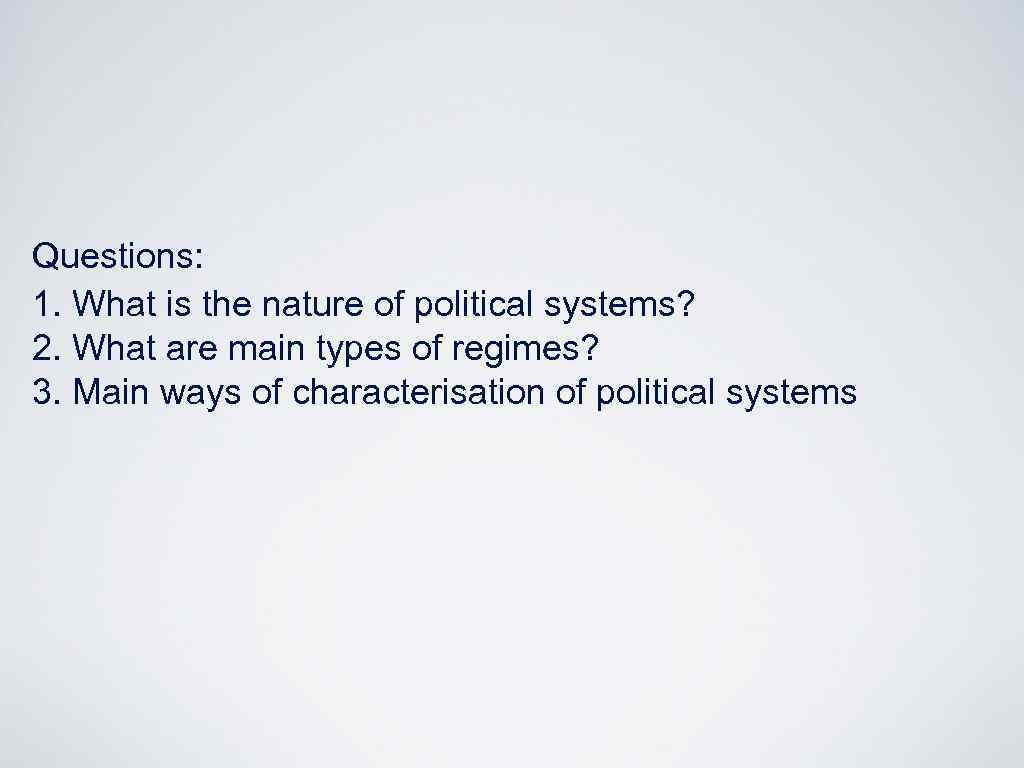 Questions: 1. What is the nature of political systems? 2. What are main types of regimes? 3. Main ways of characterisation of political systems
Questions: 1. What is the nature of political systems? 2. What are main types of regimes? 3. Main ways of characterisation of political systems
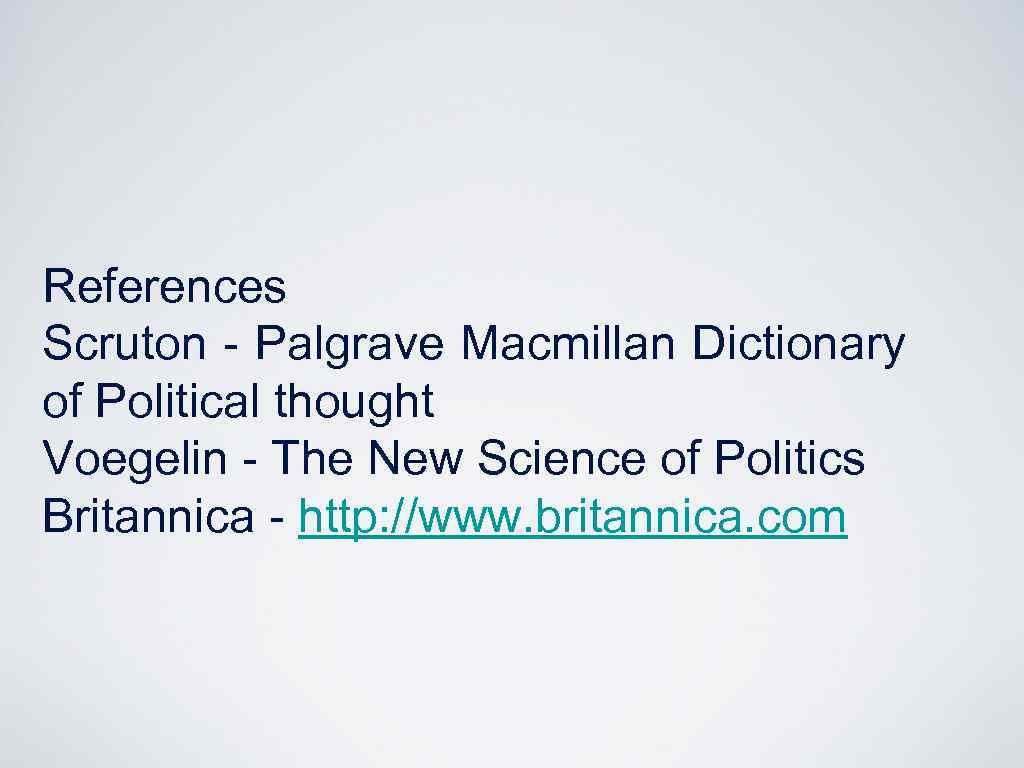 References Scruton - Palgrave Macmillan Dictionary of Political thought Voegelin - The New Science of Politics Britannica - http: //www. britannica. com
References Scruton - Palgrave Macmillan Dictionary of Political thought Voegelin - The New Science of Politics Britannica - http: //www. britannica. com


